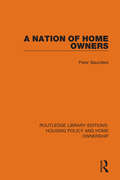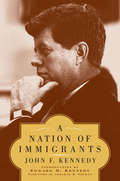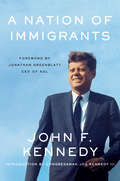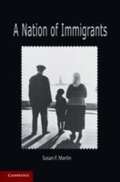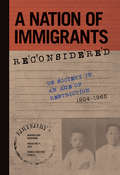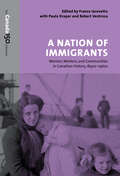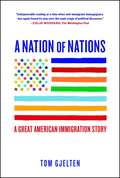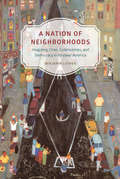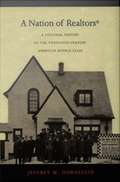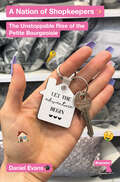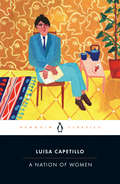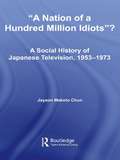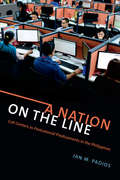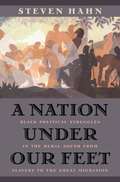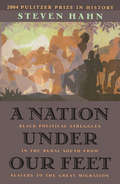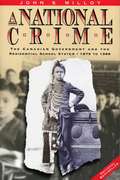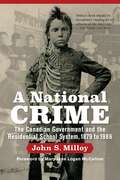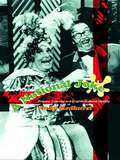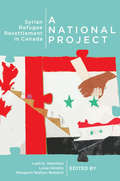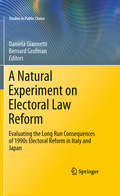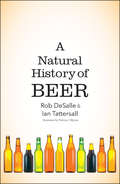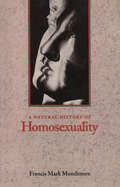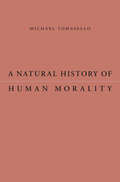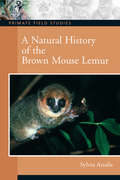- Table View
- List View
A Nation of Home Owners: What Went Wrong With Home Ownership In Britai, How To Start Putting It Right
by Peter SaundersOriginally published in 1990, and re-issued in 2020 with an updated Preface, this book shows how the UK has become a nation of home owners, and the effect it has had on people’s lives, the impact which it has had on British society and the implications for those who have hitherto been excluded. The book briefly charts the history of the growth of owner-occupation in Britain and considers the evidence on the popularity of owning as opposed to renting. The question of whether and how owner occupiers accumulate wealth from their housing is discussed and the evidence on the political implications of the growth of owner-occupation examined. The influence of buying a house on the way that home is experienced is analysed and the sociological implications in regard to the analysis of social inequalities in Britain discussed. The research for the book was based on in-depth interviews with home-owners and tenants in Burnley, Derby and Slough.
A Nation of Immigrants
by Franca Iacovetta Paula Draper Robert VentrescaThis collection brings together a wide array of writings on Canadian immigrant history, including many highly regarded, influential essays. Though most of the chapters have been previously published, the editors have also commissioned original contributions on understudied topics in the field. The readings highlight the social history of immigrants, their pre-migration traditions as well as migration strategies and Canadian experiences, their work and family worlds, and their political, cultural, and community lives. They explore the public display of ethno-religious rituals, race riots, and union protests; the quasi-private worlds of all-male boarding-houses and of female domestics toiling in isolated workplaces; and the intrusive power that government and even well-intentioned social reformers have wielded over immigrants deemed dangerous or otherwise in need of supervision.Organized partly chronologically and largely by theme, the topical sections will offer students a glimpse into Canada's complex immigrant past. In order to facilitate classroom discussion, each section contains an introduction that contextualizes the readings and raises some questions for debate. A Nation of Immigrants will be useful both in specialized courses in Canadian immigration history and in courses on broader themes in Canadian history.
A Nation of Immigrants
by John F. KennedyThroughout his presidency, John F. Kennedy was passionate about the issue of immigration reform. He believed that America is a nation of people who value both tradition and the exploration of new frontiers, people who deserve the freedom to build better lives for themselves in their adopted homeland. This modern edition of his posthumously published, timeless work—with a new introduction by Senator Edward M. Kennedy and a foreword by Abraham H. Foxman, national director of the Anti-Defamation League—offers the late president's inspiring suggestions for immigration policy and presents a chronology of the main events in the history of immigration in America.As continued debates on immigration engulf the nation, this paean to the importance of immigrants to our nation's prominence and success is as timely as ever.
A Nation of Immigrants
by John F. Kennedy“In this timeless book, President Kennedy shows how the United States has always been enriched by the steady flow of men, women, and families to our shores. It is a reminder that America’s best leaders have embraced, not feared, the diversity which makes America great.” —Former Secretary of State Madeleine K. Albright Throughout his presidency, John F. Kennedy was passionate about the issue of immigration reform. He believed that America is a nation of people who value both tradition and the exploration of new frontiers, deserving the freedom to build better lives for themselves in their adopted homeland. This 60th anniversary edition of his posthumously published, timeless work—with a foreword by Jonathan Greenblatt, the National Director and CEO of the ADL, formerly known as the Anti-Defamation League, and an introduction from Congressman Joe Kennedy III—offers President Kennedy’s inspiring words and observations on the diversity of America’s origins and the influence of immigrants on the foundation of the United States.The debate on immigration persists. Complete with updated resources on current policy, this new edition of A Nation of Immigrants emphasizes the importance of the collective thought and contributions to the prominence and success of the country.
A Nation of Immigrants
by Susan F. MartinImmigration makes America what it is and is formative for what it will become. America was settled by three different models of immigration, all of which persist to the present. The Virginia Colony largely equated immigration with the arrival of laborers, who had few rights. Massachusetts welcomed those who shared the religious views of the founders but excluded those whose beliefs challenged the prevailing orthodoxy. Pennsylvania valued pluralism, becoming the most diverse colony in religion, language, and culture. This book traces the evolution of these three models of immigration as they explain the historical roots of current policy debates and options. Arguing that the Pennsylvania model has best served the country, the final chapter makes recommendations for future immigration reform. Given the highly controversial nature of immigration in the United States, this book provides thoughtful analysis, valuable to both academic and policy audiences.
A Nation of Immigrants Reconsidered: US Society in an Age of Restriction, 1924-1965 (Studies of World Migrations #21)
by Maddalena Marinari Madeline Hsu Maria Cristina GarciaScholars, journalists, and policymakers have long argued that the 1965 Immigration and Nationality Act dramatically reshaped the demographic composition of the United States. In A Nation of Immigrants Reconsidered, leading scholars of immigration explore how the political and ideological struggles of the so-called "age of restriction"--from 1924 to 1965--paved the way for the changes to come. The essays examine how geopolitics, civil rights, perceptions of America's role as a humanitarian sanctuary, and economic priorities led government officials to facilitate the entrance of specific immigrant groups, thereby establishing the legal precedents for future policies. Eye-opening articles discuss Japanese war brides and changing views of miscegenation, the recruitment of former Nazi scientists, a temporary workers program with Japanese immigrants, the emotional separation of Mexican immigrant families, Puerto Rican youth's efforts to claim an American identity, and the restaurant raids of conscripted Chinese sailors during World War II. Contributors: Eiichiro Azuma, David Cook-Martín, David FitzGerald, Monique Laney, Heather Lee, Kathleen López, Laura Madokoro, Ronald L. Mize, Arissa H. Oh, Ana Elizabeth Rosas, Lorrin Thomas, Ruth Ellen Wasem, and Elliott Young.
A Nation of Immigrants: Women, Workers, and Communities in Canadian History, 1840s-1960s
by Franca Iacovetta Paula Draper Robert VentrescaThis collection brings together a wide array of writings on Canadian immigrant history, including many highly regarded, influential essays. Though most of the chapters have been previously published, the editors have also commissioned original contributions on understudied topics in the field. The readings highlight the social history of immigrants, their pre-migration traditions as well as migration strategies and Canadian experiences, their work and family worlds, and their political, cultural, and community lives. They explore the public display of ethno-religious rituals, race riots, and union protests; the quasi-private worlds of all-male boarding-houses and of female domestics toiling in isolated workplaces; and the intrusive power that government and even well-intentioned social reformers have wielded over immigrants deemed dangerous or otherwise in need of supervision.Organized partly chronologically and largely by theme, the topical sections will offer students a glimpse into Canada's complex immigrant past. In order to facilitate classroom discussion, each section contains an introduction that contextualizes the readings and raises some questions for debate. A Nation of Immigrants will be useful both in specialized courses in Canadian immigration history and in courses on broader themes in Canadian history.
A Nation of Nations
by Tom GjeltenThe dramatic and compelling story of the transformation of America during the last fifty years, told through a handful of families in one suburban county in Virginia that has been utterly changed by recent immigration.In the fifty years since the 1965 Immigration and Nationality Act, the foreign-born population of the United States has tripled. Significantly, these immigrants are not coming from Europe, as was the case before 1965, but from all corners of the globe. Today non-European immigration is ninety percent of the total immigration to the US. Americans today are vastly more diverse than ever. They look different, speak different languages, practice different religions, eat different foods, and enjoy different cultures. In 1950, Fairfax County, Virginia, was ninety percent white, ten percent African-American, with a little more than one hundred families who were "other." Currently the African-American percentage of the population is about the same, but the Anglo white population is less than fifty percent, and there are families of Asian, African, Middle Eastern, and Latin American origin living all over the county. A Nation of Nations follows the lives of a few immigrants to Fairfax County over recent decades as they gradually "Americanize." Hailing from Korea, Bolivia, and Libya, these families have stories that illustrate common immigrant themes: friction, between minorities, economic competition and entrepreneurship, and racial and cultural stereotyping. It's been half a century since the 1965 Immigration and Nationality Act changed the landscape of America, and no book has assessed the impact or importance of this law as this one does, with its brilliant combination of personal stories and larger demographic and political issues.
A Nation of Neighborhoods: Imagining Cities, Communities, and Democracy in Postwar America
by Benjamin LookerDespite the pundits who have written its epitaph and the latter-day refugees who have fled its confines for the half-acre suburban estate, the city neighborhood has endured as an idea central to American culture. In A Nation of Neighborhoods, Benjamin Looker presents us with the city neighborhood as both an endless problem and a possibility. Looker investigates the cultural, social, and political complexities of the idea of "neighborhood" in postwar America and how Americans grappled with vast changes in their urban spaces from World War II to the Reagan era. In the face of urban decline, competing visions of the city neighborhood's significance and purpose became proxies for broader debates over the meaning and limits of American democracy. By studying the way these contests unfolded across a startling variety of genres--Broadway shows, radio plays, urban ethnographies, real estate documents, and even children's programming--Looker shows that the neighborhood ideal has functioned as a central symbolic site for advancing and debating theories about American national identity and democratic practice.
A Nation of Realtors®: A Cultural History of the Twentieth-Century American Middle Class
by Jeffrey M. HornsteinHow is it that in the twentieth century virtually all Americans came to think of themselves as "middle class"? In this cultural history of real estate brokerage, Jeffrey M. Hornstein argues that the rise of the Realtors as dealers in both domestic space and the ideology of home ownership provides tremendous insight into this critical question. At the dawn of the twentieth century, a group of prominent real estate brokers attempted to transform their occupation into a profession. Drawing on traditional notions of the learned professions, they developed a new identity--the professional entrepreneur--and a brand name, "Realtor. " The Realtors worked doggedly to make home ownership a central element of what became known as the "American dream. " Hornstein analyzes the internal evolution of the occupation, particularly the gender dynamics culminating in the rise of women brokers to predominance after the Second World War. At the same time, he examines the ways organized real estate brokers influenced American housing policy throughout the century. Hornstein draws on trade journals, government documents on housing policy, material from the archives of the National Association of Realtors and local real estate boards, demographic data, and fictional accounts of real estate agents. He chronicles the early efforts of real estate brokers to establish their profession by creating local and national boards, business practices, ethical codes, and educational programs and by working to influence laws from local zoning ordinances to national housing policy. A rich and original work of American history, A Nation of Realtors illuminates class, gender, and business through a look at the development of a profession and its enormously successful effort to make the owner-occupied, single-family home a key element of twentieth-century American identity.
A Nation of Shopkeepers: The Unstoppable Rise of the Petite Bourgeoisie
by Dan EvansA Nation of Shopkeepers explores the unstoppable rise of the petite-bourgeoisie, one of the most powerful, but underexplored, classes in modern society.The petite-bourgeoisie — the insecure class between the working class and the bourgeoisie — is hugely significant within global politics. Yet it remains something of a mystery.Initially identified as a powerful political force by theorists like Marx and Poulantzas, the petit-bourgeoisie was expected to decline, as small businesses and small property were gradually swallowed up by monopoly capitalism. Yet, far from disappearing, structural changes to the global economy under neoliberalism have instead grown the petite-bourgeoisie, and the individualist values associated with it have been popularized by a society which fetishizes "aspiration", home ownership and entrepreneurship. So why has this happened?A Nation of Shopkeepers sheds a light on this mysterious class, exploring the class structure of contemporary Britain and the growth of the petite-bourgeoisie following Thatcherism. It shows how the rise of home ownership, small landlordism and radical changes to the world of work have increasingly inculcated values of petite-bourgeois individualism; how popular culture has promoted and reproduced values of aspiration and conspicuous consumption that militate against socialist organizing; and, most importantly, what the unstoppable rise of the petit-bourgeoisie means for the left.
A Nation of Women: An Early Feminist Speaks Out (Recovering The U. S. Hispanic Literary Heritage)
by Luisa CapetilloThe groundbreaking feminist and socialist writings of Puerto Rican author and activist Luisa Capetillo. <p><p> In 1915, Puerto Rican activist Luisa Capetillo was arrested and acquitted for being the first woman to wear men's trousers publicly. While this act of gender-nonconforming rebellion elevated her to feminist icon status in modern pop culture, it also overshadowed the significant contributions she made to the women's movement and anarchist labor movements of the early twentieth century--both in her native Puerto Rico and in the migrant labor belt in the eastern United States. With the volume A Nation of Women, Capetillo's socialist and feminist activism is given the spotlight it deserves with its inclusion of the first English translation of Capetillo's landmark Mi opinión sobre las libertades, derechos y deberes de la mujer. <p><p> Originally published in Spanish in 1911, Mi opinión is considered by many to be the first feminist treatise in Puerto Rico and one of the first in Latin America and the Caribbean. In concise prose, Capetillo advocates a workers' revolution, forcefully demanding an end to the exploitation and subordination of workers and women. Her essays challenge big business in favor of socialism, call for legalizing divorce and the acceptance of "free love" in relationships, and cover topics such as sexuality, mental and physical health, hygiene, spirituality, and nutrition. At once a sharp critique and a celebration of the gathering fervor of world politics, A Nation of Women embraces the humanistic thinking of the early twentieth century and envisions a world in which economic and social structures can be broken down, allowing both the worker and the woman to be free.
A Nation of a Hundred Million Idiots?: A Social History of Japanese Television, 1953 - 1973 (East Asia: History, Politics, Sociology and Culture)
by Jayson Makoto ChunThis book offers a history of Japanese television audiences and the popular media culture that television helped to spawn. In a comparatively short period, the television industry helped to reconstruct not only postwar Japanese popular culture, but also the Japanese social and political landscape. During the early years of television, Japanese of all backgrounds, from politicians to mothers, debated the effects on society. The public discourse surrounding the growth of television revealed its role in forming the identity of postwar Japan during the era of high-speed growth (1955-1973) that saw Japan transformed into an economic power and one of the world's top exporters of television programming.
A Nation on the Line: Call Centers as Postcolonial Predicaments in the Philippines
by Jan M. PadiosIn 2011 the Philippines surpassed India to become what the New York Times referred to as "the world's capital of call centers." By the end of 2015 the Philippine call center industry employed over one million people and generated twenty-two billion dollars in revenue. In A Nation on the Line Jan M. Padios examines this massive industry in the context of globalization, race, gender, transnationalism, and postcolonialism, outlining how it has become a significant site of efforts to redefine Filipino identity and culture, the Philippine nation-state, and the value of Filipino labor. She also chronicles the many contradictory effects of call center work on Filipino identity, family, consumer culture, and sexual politics. As Padios demonstrates, the critical question of call centers does not merely expose the logic of transnational capitalism and the legacies of colonialism; it also problematizes the process of nation-building and peoplehood in the early twenty-first century.
A Nation under Our Feet: Black Political Struggles in the Rural South from Slavery to the Great Migration
by Steven HahnThis is the epic story of how African-Americans, in the six decades after their release from slavery, transformed themselves into a political people- an embryonic black nation.<P><P> Pulitzer Prize Winner
A Nation under Our Feet: Black Political Struggles in the Rural South from Slavery to the Great Migration
by Steven HahnThis is the epic story of how African-Americans, in the six decades following slavery, transformed themselves into a political people—an embryonic black nation. As Steven Hahn demonstrates, rural African-Americans were central political actors in the great events of disunion, emancipation, and nation-building. At the same time, Hahn asks us to think in more expansive ways about the nature and boundaries of politics and political practice. Emphasizing the importance of kinship, labor, and networks of communication, A Nation under Our Feet explores the political relations and sensibilities that developed under slavery and shows how they set the stage for grassroots mobilization. Hahn introduces us to local leaders, and shows how political communities were built, defended, and rebuilt. He also identifies the quest for self-governance as an essential goal of black politics across the rural South, from contests for local power during Reconstruction, to emigrationism, biracial electoral alliances, social separatism, and, eventually, migration. Hahn suggests that Garveyism and other popular forms of black nationalism absorbed and elaborated these earlier struggles, thus linking the first generation of migrants to the urban North with those who remained in the South. He offers a new framework—looking out from slavery—to understand twentieth-century forms of black political consciousness as well as emerging battles for civil rights. It is a powerful story, told here for the first time, and one that presents both an inspiring and a troubling perspective on American democracy.
A National Crime: The Canadian Government and the Residential School System
by John S. Milloy“I am going to tell you how we are treated. I am always hungry.” — Edward B., a student at Onion Lake School (1923) "[I]f I were appointed by the Dominion Government for the express purpose of spreading tuberculosis, there is nothing finer in existance that the average Indian residential school.” — N. Walker, Indian Affairs Superintendent (1948) For over 100 years, thousands of Aboriginal children passed through the Canadian residential school system. Begun in the 1870s, it was intended, in the words of government officials, to bring these children into the “circle of civilization,” the results, however, were far different. More often, the schools provided an inferior education in an atmosphere of neglect, disease, and often abuse. Using previously unreleased government documents, historian John S. Milloy provides a full picture of the history and reality of the residential school system. He begins by tracing the ideological roots of the system, and follows the paper trail of internal memoranda, reports from field inspectors, and letters of complaint. In the early decades, the system grew without planning or restraint. Despite numerous critical commissions and reports, it persisted into the 1970s, when it transformed itself into a social welfare system without improving conditions for its thousands of wards. A National Crime shows that the residential system was chronically underfunded and often mismanaged, and documents in detail and how this affected the health, education, and well-being of entire generations of Aboriginal children.
A National Crime: The Canadian Government and the Residential School System
by John S. Milloy Mary Jane Mccallum“I am going to tell you how we are treated. I am always hungry.” — Edward B., a student at Onion Lake School (1923) "[I]f I were appointed by the Dominion Government for the express purpose of spreading tuberculosis, there is nothing finer in existance that the average Indian residential school.” — N. Walker, Indian Affairs Superintendent (1948) For over 100 years, thousands of Aboriginal children passed through the Canadian residential school system. Begun in the 1870s, it was intended, in the words of government officials, to bring these children into the “circle of civilization,” the results, however, were far different. More often, the schools provided an inferior education in an atmosphere of neglect, disease, and often abuse. Using previously unreleased government documents, historian John S. Milloy provides a full picture of the history and reality of the residential school system. He begins by tracing the ideological roots of the system, and follows the paper trail of internal memoranda, reports from field inspectors, and letters of complaint. In the early decades, the system grew without planning or restraint. Despite numerous critical commissions and reports, it persisted into the 1970s, when it transformed itself into a social welfare system without improving conditions for its thousands of wards. A National Crime shows that the residential system was chronically underfunded and often mismanaged, and documents in detail and how this affected the health, education, and well-being of entire generations of Aboriginal children.
A National Joke: Popular Comedy and English Cultural Identities
by Andy MedhurstComedy is crucial to how the English see themselves. This book considers that proposition through a series of case studies of popular English comedies and comedians in the twentieth century, ranging from the Carry On films to the work of Mike Leigh and contemporary sitcoms such as The Royle Family, and from George Formby to Alan Bennett and Roy 'Chubby' Brown. Relating comic traditions to questions of class, gender, sexuality and geography, A National Joke looks at how comedy is a cultural thermometer, taking the temperature of its times. It asks why vulgarity has always delighted English audiences, why camp is such a strong thread in English humour, why class influences what we laugh at and why comedy has been so neglected in most theoretical writing about cultural identity. Part history and part polemic, it argues that the English urgently need to reflect on who they are, who they have been and who they might become, and insists that comedy offers a particularly illuminating location for undertaking those reflections.
A National Project: Syrian Refugee Resettlement in Canada (McGill-Queen's Refugee and Forced Migration Studies)
by Leah K. Hamilton, Luisa Veronis, and Margaret Walton-RobertsSince the outbreak of the Syrian Civil War in 2011, over 5.6 million people have fled Syria and another 6.6 million remain internally displaced. By January 2017, a total of 40,081 Syrians had sought refuge across Canada in the largest resettlement event the country has experienced since the Indochina refugee crisis. Breaking new ground in an effort to understand and learn from the Syrian Refugee Resettlement Initiative that Canada launched in 2015, A National Project examines the experiences of refugees, receiving communities, and a range of stakeholders who were involved in their resettlement, including sponsors, service providers, and various local and municipal agencies. The contributors, who represent a wide spectrum of disciplines, include many of Canada's leading immigration scholars and others who worked directly with refugees. Considering the policy behind the program and the geographic and demographic factors affecting it, chapters document mobilization efforts, ethical concerns, integration challenges, and varying responses to resettling Syrian refugees from coast to coast. Articulating key lessons to be learned from Canada's program, this book provides promising strategies for future events of this kind. Showcasing innovative practices and initiatives, A National Project captures a diverse range of experiences surrounding Syrian refugee resettlement in Canada.
A Natural Experiment on Electoral Law Reform: Evaluating the Long Run Consequences of 1990s Electoral Reform in Italy and Japan (Studies in Public Choice #24)
by Bernard Grofman Daniela GiannettiIn the early 1990s, major electoral reforms took place in both Italy and Japan; each replaced a form of "proportional representation" (in which voters cast a ballot for a party list) with a "mixed member" system (in which voters cast ballots for individual candidates and party lists). The reforms were enacted by political elites in the context of divisions within the dominant party, changing patterns of party support, and party splits, in efforts to retain power while responding to charges of corruption, clientelism, and lack of accountability. The experiences of both countries provide a laboratory in which to investigate the effects and implications of the reforms, and, more broadly to analyze voter behavior in the context of institutional change. The introduction provides an overview of post-WWII politics and electoral reform in Italy and Japan. In each of the next four chapters, specialists in Italian and Japanese electoral politics are teamed up to review data both before and after the reforms. Within this comparative framework, the authors explore such topics as changes in party competition, candidate selection mechanisms, and intra-party politics. The concluding chapter considers the longer-term consequences--both anticipated and unanticipated--of the reforms; despite superficially similar conditions, the effects in the two countries were dramatically different: in Japan, the new system has taken hold, with minor modifications, while in Italy, there was a reversion to a proportional representation system. As the essays in this volume demonstrate, to understand why similar reforms had such different effects in the two countries we must examine how electoral systems are embedded in broader institutional and social arrangements, and at the complex interplay of political geography, political history, and the rational calculations of political actors.
A Natural History of Beer
by Ian Tattersall Rob DeSalleA celebration of beer—its science, its history, and its impact on human culture What can beer teach us about biology, history, and the natural world? From ancient Mesopotamian fermentation practices to the resurgent American craft brewery, Rob DeSalle and Ian Tattersall peruse the historical record and traverse the globe for engaging and often surprising stories about beer. They explain how we came to drink beer, what ingredients combine to give beers their distinctive flavors, how beer’s chemistry works at the molecular level, and how various societies have regulated the production and consumption of beer. Drawing from such diverse subject areas as animal behavior, ecology, history, archaeology, chemistry, sociology, law, genetics, physiology, neurobiology, and more, DeSalle and Tattersall entertain and inform with their engaging stories of beer throughout human history and the science behind it all. Readers are invited to grab a beer and explore the fascinating history of its creation.
A Natural History of Homosexuality
by Francis Mark MondimoreSelected by Choice Magazine as an Outstanding Academic TitleA terrible sin, a gift from the gods, a mental illness, a natural human variation—over the centuries people have defined homosexuality in all of these ways. Since the word homosexual was coined in 1869, many scientists in a variety of fields have sought to understand same-sex intimacy. Drawing on recent insights in biology and genetics, psychiatrist Francis Mondimore set out to explore the complex landscape of sexual orientation.The result is A Natural History of Homosexuality, a generous work that synthesizes research in biology, history, psychology, and politics to explain how homosexuality has been understood and defined from ancient times until the present. Mondimore narrates tales of love and courage as well as discrimination and bigotry in settings as diverse as ancient Greece and Victorian England, early America and fin de siecle Vienna. He also tells fascinating stories about societies which accepted, incorporated, or institutionalized homosexuality into mainstream culture, stories illustrating that same-sex eroticism was often accepted as a normal aspect of human sexuality. In twentieth-century America, researchers first recognized that homosexuality might not be "pathological" when Alfred Kinsey and Evelyn Hooker conducted the first studies of sexuality not biased by preconceived notions of "normal" sexual behavior. After exploring sexual development in the human fetus, Mondimore reviews current biological research into the nature of sexual orientation and examines recent scientific findings on the role of heredity and hormones, as well as Simon LeVay's 1991 brain studies. He then turns to a very important focus: on people and their individual experiences. He explores "what happens between childhood and adulthood in an individual that makes him or her come to identify himself or herself as having a sexual orientation." He also explains our current understanding of bisexuality and the transgender phenomena of transsexualism and transvestism. Finally, Mondimore analyzes the circumstances of such prominent scandals as the anti-homosexual trials of Oscar Wilde and Philip von Eulenberg, and recounts the Nazi persecution of homosexuals during the Holocaust. This far-reaching discussion includes a description of the ex-gay ministries and reparative therapy as well as the Stonewall riots and AIDS, ending with the emergence of gay pride and community.
A Natural History of Human Morality
by Michael TomaselloMichael Tomasello offers the most detailed account to date of the evolution of human moral psychology. Based on experimental data comparing great apes and human children, he reconstructs two key evolutionary steps whereby early humans gradually became an ultra-cooperative and, eventually, a moral species capable of acting as a plural agent "we".
A Natural History of the Brown Mouse Lemur
by Sylvia AtsalisThis text can be used for any undergraduate or graduate course with a primate behavior or primate ecology component. It can also be used as supplemental reading, for any advanced animal behavior class. There are very few books that address the biology of nocturnal primates. There are even fewer that delve with any detail regarding the behavior of specific species. These animals are difficult to follow. Their diminutive size, the thickness of the vegetation, and their nocturnal habits, make the study of their habits a demanding task.Through a trial of patience, Sylvia Atsalis has undertaken this task. Here she provides an in depth view at the life and behavioral patterns of these tiny primates. A Natural History of the Brown Mouse Lemur provides the most complete look at the behavior and ecology of mouse lemurs.
